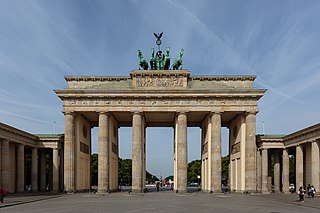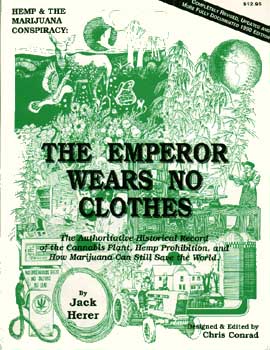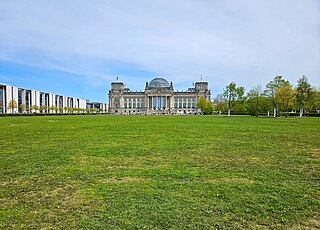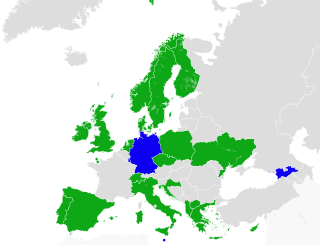
Alexanderplatz is a large public square and transport hub in the central Mitte district of Berlin. The square is named after the Russian Tsar Alexander I, which also denotes the larger neighbourhood stretching from Mollstraße in the north-east to Spandauer Straße and the Rotes Rathaus in the south-west.

The Brandenburg Gate is an 18th-century neoclassical monument in Berlin. One of the best-known landmarks of Germany, it was erected on the site of a former city gate that marked the start of the road from Berlin to Brandenburg an der Havel, the former capital of the Margraviate of Brandenburg. The current structure was built from 1788 to 1791 by orders of King Frederick William II of Prussia, based on designs by the royal architect Carl Gotthard Langhans. The bronze sculpture of the quadriga crowning the gate is a work by the sculptor Johann Gottfried Schadow.

U5 is a line on the Berlin U-Bahn. It runs from Hauptbahnhof in Mitte eastwards through Alexanderplatz, Friedrichshain, Lichtenberg and Friedrichsfelde, surfaces in Biesdorf-Süd to pass Kaulsdorf and Hellersdorf above ground and finally reaches city limits at Hönow.

Christopher Street Day (CSD) is an annual European LGBTQ+ celebration and demonstration held in various cities across Europe for the rights of LGBTQ+ people, and against discrimination and exclusion. It is Germany's and Switzerland's counterpart to Gay Pride or Pride Parades. Austria calls their Pride Parade Rainbow Parade. The most prominent CSD events are Berlin Pride, CSD Hamburg, and CSD Cologne in Germany, and CSD Zürich in Switzerland.

The Emperor Wears No Clothes is a non-fiction book written by Jack Herer. Starting in 1973, the story begins when Herer takes the advice of his friend, "Captain" Ed Adair, and begins compiling tidbits of information about the cannabis plant and its numerous uses, including as hemp and as a drug. After a dozen years of collecting and compiling historical data, Herer first published his work as The Emperor Wears No Clothes, in 1985. The twelfth edition was published in November 2010, and the book continues to be cited in Cannabis rescheduling and re-legalization efforts.

The Alexanderplatz demonstration was a demonstration for political reforms and against the government of the German Democratic Republic on Alexanderplatz in East Berlin on Saturday 4 November 1989. With between half a million and a million protesters it was one of the largest demonstrations in East German history[A] and a milestone of the peaceful revolution that led to the fall of the Berlin Wall and German reunification. The demonstration was organized by actors and employees of theaters in East Berlin. It was the first demonstration in East German history that was organized by private individuals and was permitted to take place by the authorities. The speakers during the demonstration were members of the opposition, representatives of the regime and artists, and included the dissidents Marianne Birthler and Jens Reich, the writer Stefan Heym, the actor Ulrich Mühe, the former head of the East German foreign intelligence service Markus Wolf and Politburo member Günter Schabowski.

The Monday demonstrations were a series of peaceful political protests against the government of the German Democratic Republic (GDR). The demonstrations began in Leipzig on 4 September 1989, starting the Peaceful Revolution in the GDR: the fall of the Berlin Wall, the collapse of the government, and German reunification.

The Monument to Freedom and Unity is a planned national German monument in Berlin commemorating the country's peaceful reunification in 1990 and earlier 18th, 19th and 20th century unification movements.

Platz der Republik is a square in Berlin, Germany. It is located in the Tiergarten, directly in front (west) of the Reichstag building. The square has an area of about 36,900 square meters and is almost completely covered by grass but is decorated with some hedges and a few trees.

Cannabis in Wisconsin is illegal for recreational use. Possession of any amount is punishable by up to 6 months in prison and a $1000 fine for a first offense. A second offense is punished as a felony with up to 3.5 years in prison and up to a $10,000 fine. At the local level, however, numerous municipalities and counties have decriminalized cannabis or lessened penalties for minor possession offenses. Medical use is legal only in the form of low-THC cannabis oil.

Cannabis in Germany has been legal for recreational usage by adults in a limited capacity since 1 April 2024, making it the ninth country in the world to legalise the drug. As of February 2024, it has been assessed that 4.5 million Germans use cannabis.

Cannabis is illegal in Russia. Possession of up to 6 grams is an administrative offense, punishable by a fine or detention of 15 days. Possession of larger amounts is a criminal offense.

The Hemp Museum was opened in Berlin on 6 December 1994. It is the only museum in Germany focused on the cannabis plant. The museum also actively promotes the protection of children and young people and offers individually tailored tours of the exhibition with care staff. It serves as a meeting place for the organisers of the Hanfparade. The Hanf Museum regularly takes part in the "Long Night of Museums", the Berlin Fairytale Days and the Historale which takes place in the Nikolai Quarter. In 2017, the Hanf Museum took part in the Kirchentag in Berlin as a self-organised event on the topic of the war on drugs with speakers from South American victims, including the Reverend Martin Diaz from El Salvador.

Cannabis in Ukraine is legal for medical, industrial purposes, and scientific and scientific-technical activities.
The German cannabis control bill is a bill passed by the German Bundestag in February 2024, and the Bundesrat in March, that legalised the adult use of cannabis in Germany, as well as the personal possession and cultivation of limited amounts of cannabis by adults in Germany, beginning on 1 April 2024. Adults in Germany are allowed to possess up to 25 grams of cannabis in public and up to 50 grams of dried cannabis at home. Each individual adult in Germany may also have up to three of their own cannabis plants at home. As part of the bill, adult-only non-profit cannabis social clubs with a maximum of 500 members will become legal in Germany from 1 July 2024.

Terms related to cannabis include:

Republic Day was an official holiday in East Germany, celebrated annually on 7 October from 1949 to 1989. Republic Day commemorates the anniversary of the establishment of the German Democratic Republic on 7 October 1949. On Republic Day, the Government of the GDR awarded many people the National Award of the GDR.

Since April 2020, when Germany's Federal Constitutional Court ruled that the governmental lockdown imposed in March to counter the COVID-19 pandemic did not allow blanket bans on rallies, numerous protests have been held in Germany against anti-pandemic regulations. The protests attracted a mix of people from varied backgrounds, including supporters of populist ideas who felt called to defend against what they saw as an arrogant central government; supporters of various conspiracy theories; and sometimes far right-wing groups. Anti-vaxxers generally also formed a major part of the protesters. Some protesters held strongly negative views towards public media, who they believed to report in an unfair manner; repeatedly, journalists covering the rallies were subjected to harassment and physical attacks. Such attacks were the main reason why Germany slipped from eleventh to 13th place in the Press Freedom Index of Reporters Without Borders, according to a report published on 20 April 2021.
The Association of Swiss Hemp Friends, better known as Verein Schweizer Hanf-freunde (VSFH) or ASAC, is an organization situated at St Gallen, Switzerland known for its activities towards legalization of free cultivation, consumption, personal, medicinal usage and commercial exchange of hemp unrelated to any narcotic usage. The organization is also known to advocate the farming of hemp plants by providing supports to the farmers and peasants as the efforts to make agricultural usage of hemp sustainable under prevailing governmental regulations about cannabis usage.
The Leipzig Beat Revolt, in German also called Leipziger Beatdemo, Beatkrawalle or Beataufstand, took place on 31 October 1965 in Leipzig-Mitte. The demonstration was an expression of youth emancipation in the GDR, directed against the state ban on beat music and numerous beat groups. The main reason for the demonstration was the ban imposed ten days earlier on 54 of the 58 registered Leipzig bands, including the popular band Butlers. The demonstration was violently broken up by the Volkspolizei and the Stasi immediately after the start. Of the 264 demonstrators arrested, 97 were deployed for up to six weeks on “supervised work” in the Kitzscher and United Schleenhain coal mine. The Leipzig Beat Demo was the largest non-approved demonstration in the GDR after the events of 17 June 1953 and, along with the events of 7 October 1977 on Berlin's Alexanderplatz, remained unique in this form until autumn 1989.
























